Elegoo Phecda
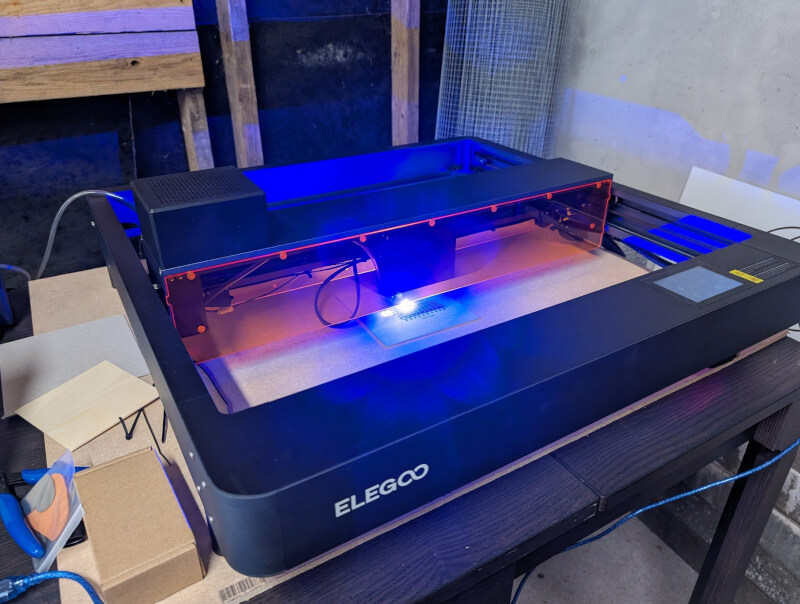
Central Features
- 10W/20W Output Power
- 400 x 400 mm Engraving Area
- Up to 25,000 mm/min Engraving Speed
- Smoke Filtering Exhaust
Elegoo Phecda comes in both a 10W and a 20W version and in several SKUs in relation to which accessories are included. In our test, we have passed the 20W version in a bundle with their Air Assist unit.
A trip around Elegoo Phecda
The Elegoo Phecda comes disassembled in a relatively flat box, which of course means that it is easier to ship around the world.
However, this also means that a fairly extensive assembly is required before you are ready to boot up the device and get started. Elegoo has made sure to divide and mark the screws and accessories quite well, and of course a guide is included.
It is a great help that all screws etc. are clearly marked, but the instructions themselves could well have been designed better. There were several sections I had to go through multiple times to make sure things came together properly.
Cables must be connected in several places to make the various components work, but here too Elegoo had made sure to mark them clearly.
However, it is a good idea to take it easy and proceed systematically, as there is a lot to keep track of if you have not messed with this type of machine before.
It took me about an hour and a half to get all the things together and ready to start up the machine.
All connections are located on the right side of the machine. Here we find the power plug together with the power button and a USB plug and the Micro SD card reader.
On the underside there is also a WiFi antenna, which makes it possible to use the machine wirelessly via an App Elegoo has made for the machine.
The primary parts of the Phecda are made of aluminum and the materials and build quality feel mostly good.
Accessories for the machine in our bundle are a set of safety glasses, which are super important to remember when the machine is running. In addition to that, an Air Assist unit is also included. It is a small pump unit that blows air down over the focus area of the laser, so smoke and the like. does not create problems for its precision.
However, it is a somewhat difficult solution, where you have to pull a hose down to the laser, which could potentially end up getting in the way when the machine is working.
A set of extra legs is also included so that you can raise the working height of the machine if needed with certain materials.
Software
As I touched on earlier, the Elegoo Phecda has a trickless option. However, it is exclusively for use with Elegoo's own app. You cannot connect the machine to your own home network and connect via software from your PC, e.g.
Instead, your Phecda machine creates a WiFi network that you have to connect and then use the Elegoo Phecda app that way.
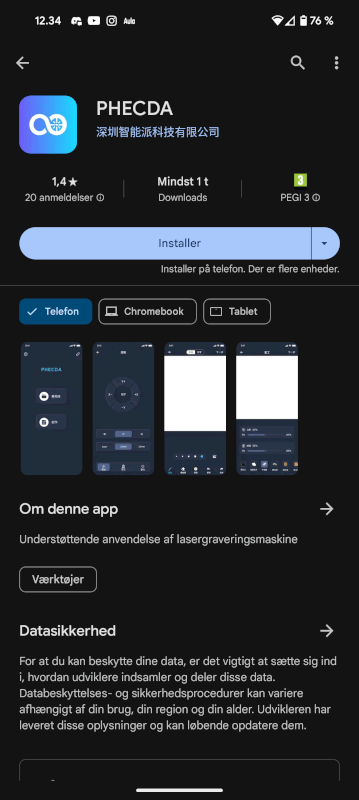
Through the app you can send simple tasks to the machine, where you can choose from a selection of graphics in the app or add your own via the phone.
There is also a selection of materials to choose from with pre-defined settings which I would assume are based on Elegoo's own tests with the machine and the various materials.
However, at no point during my test could I get the app to connect to our Phecda machine, so I have not been able to test the functionality.
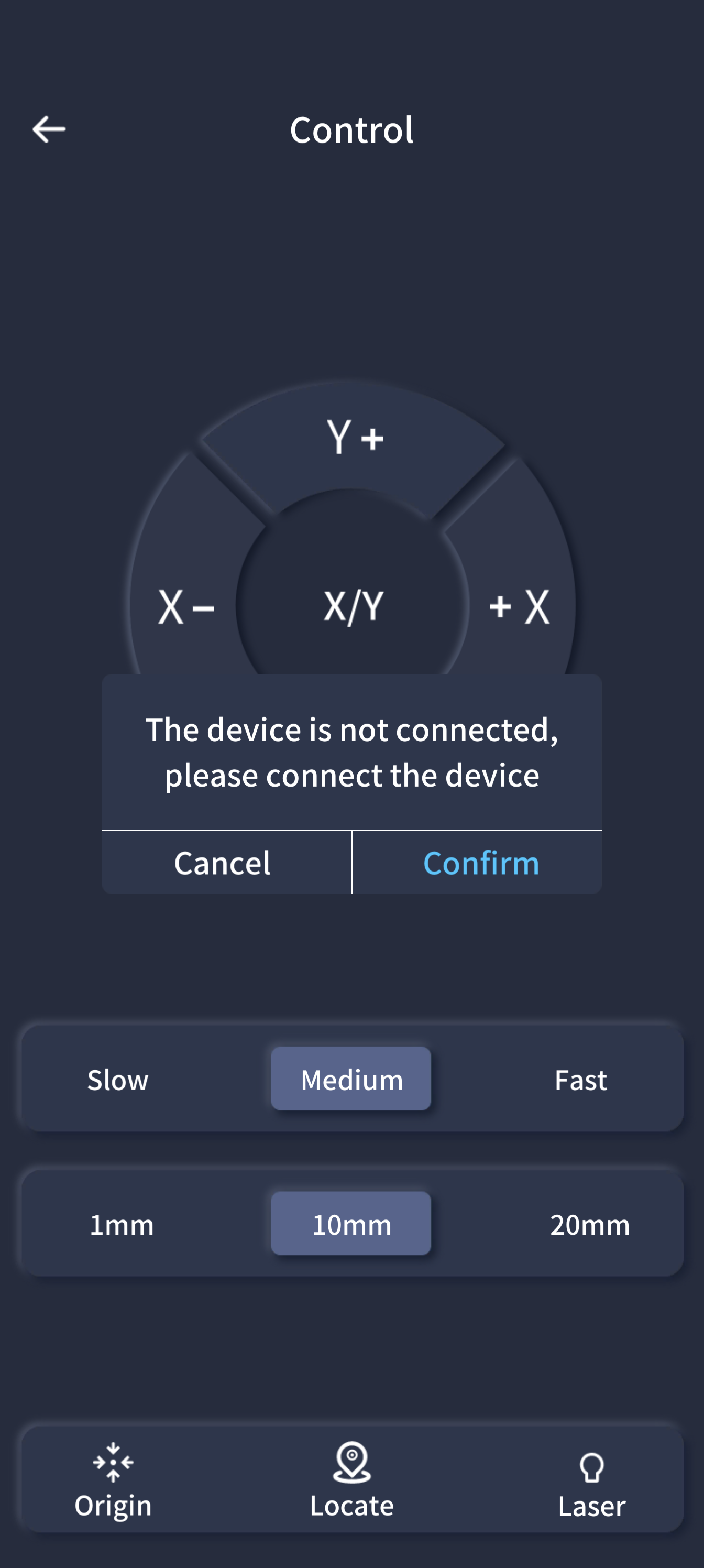
In order to be able to get the machine started with tasks, you have to go through some software on your PC. Here, Elegoo itself has nothing available, apart from their non-functional app, so you have to get hold of third-party programs.
Elegoo even mentions the free LaserGRBL, which is also included on the included MicroSD card. However, it is a piece of software that I feel bears the stamp of being free.
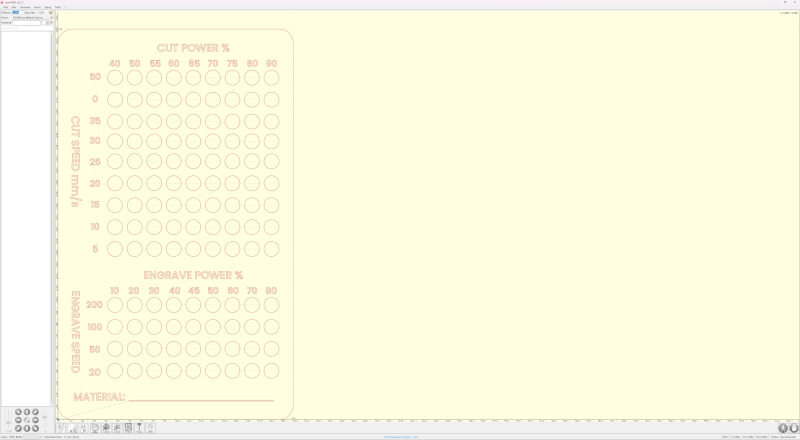
I chose instead to use the LightBurn software, which is not free but is somewhat more widespread and used, and is therefore easier to find support for. There is an option for a 30-day trial of LightBurn, but after that it costs DKK 523 for a lifetime license.
Elegoo Phecda is my first experience with a Laser Cutter/Engraver and the same with the LightBurn software. This means there is a learning curve to getting things started. It is, however, made easier by LightBurn, which, as I said, is quite popular and there are therefore many guides and files that can be used together with the software.
Testing
As I just touched on, the Elegoo Phecda is my first experience with a Laser Cutter/Engraver, so I can therefore give the completely authentic beginner's experience.
The learning curve is quite steep to begin with and it is not something you get started with quickly. There are a number of variables that determine whether your project will be a success or a resounding failure.
The speed of the laser, the energy it cuts/burns with, together with the material, are all the same things that must be adapted to each other in order to get the desired result.
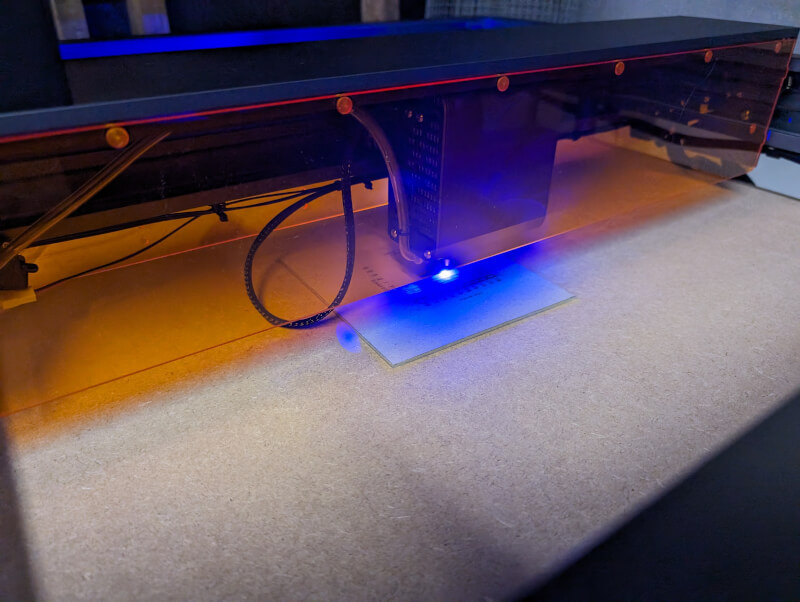
In their instructions, Elegoo has a list of recommended settings for different materials. However, it is only indicative and a lot of testing and experimentation is required to find the right settings.
If you use the LightBurn software, however, there is a material test you can run to test different settings on your materials before you tackle larger projects.
This kind of thing is worth its weight in gold and the test can be completed quite quickly, to tune in to how things should be set.
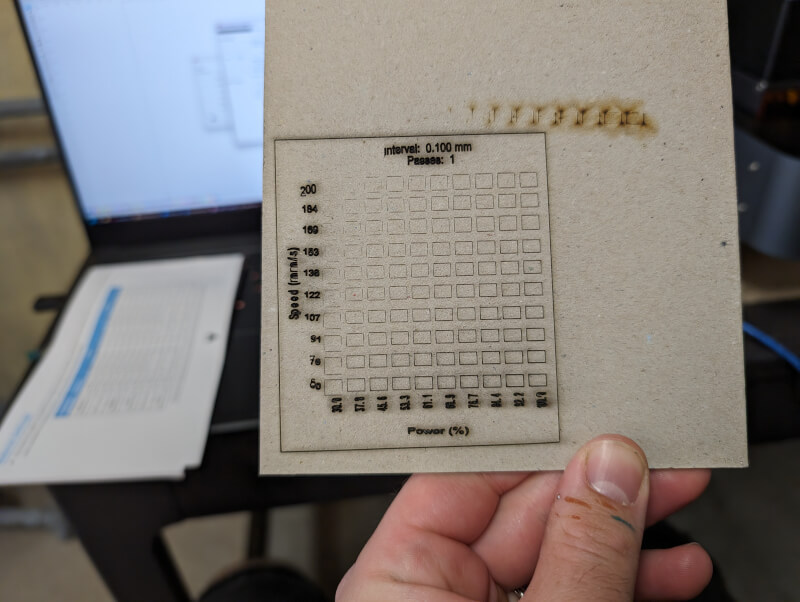
Here it might also be appropriate to emphasize that this is NOT a machine you should use in the living room or hobby room in an apartment or house, unless you have dedicated and efficient extraction. The process actually burns the materials used, which creates a lot of smoke and not least smell, which is definitely not something you should have in the home.
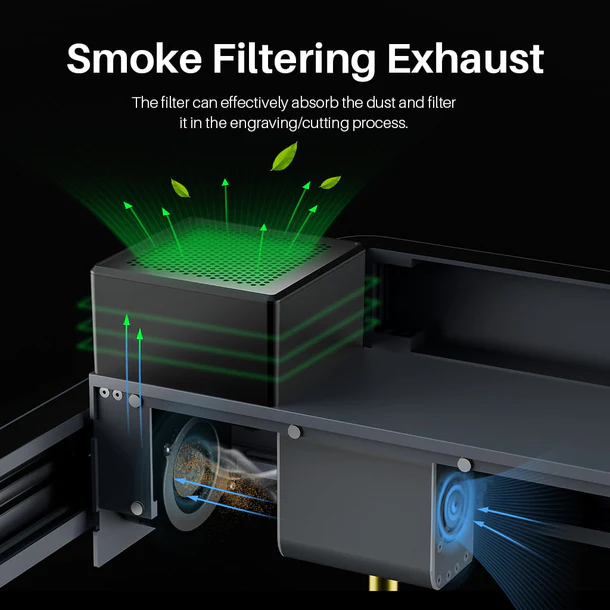
There is probably a filter on the machine that takes some of the smoke, but I still smelled a bit of fire after some time in the company of the machine. My solution was to create a setup in the garage where, with the gate open, I could create a sensible environment to work in. However, that would probably not be a useful solution in the winter.
At the same time, it is not a machine that you should start and leave, like, for example, a 3D Printer. There is a real risk of fire, and therefore the machine should always be supervised to some degree.
There is a built-in detector in the machine that stops the machine and starts an alarm if a part catches fire. However, it does not extinguish the fire, of course, so you should be nearby in case of an accident.
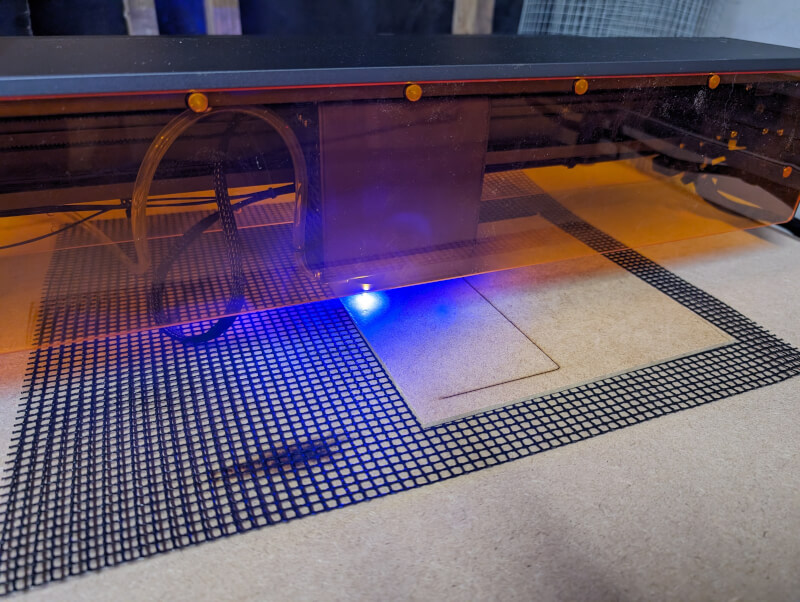
With all that in mind and a learning curve for the software behind us, I would say that the possibilities are quite good with Elegoo Phecda once you get the hang of things.
However, I experienced a lot of starting problems, as some of the physical elements of the machine such as the motor belts and wheels after assembly were not tight enough. It led to very imprecise and skewed attempts to start with.
The guidance to remedy these issues was not particularly good on Elegoo's part and it took some work on my part to get things right.
The most annoying thing on that point, however, was that Elegoo seems to have saved a little too much on the quality of the screws for the machine. This resulted in one of the screws that I had to use to tighten one motor band being stripped and could not be loosened or tightened. So I had to cut the screw to be able to use an alternative bit to get it out.
So after half a day of troubleshooting and troubleshooting various parts, I was ready to tackle a few projects.
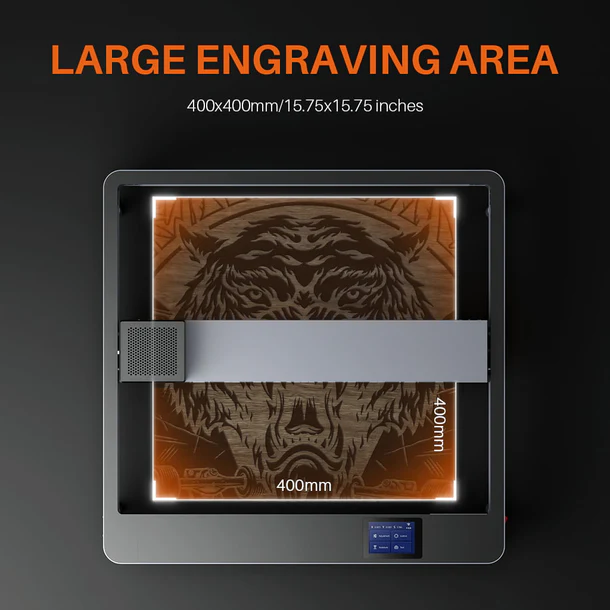
You can of course throw yourself into making your own creations in a combination of LightBurn and image processing software.
However, to speed up the process, I threw myself into files that others had made. A great deal can be found both free and paid on the internet on sites like Etsy.
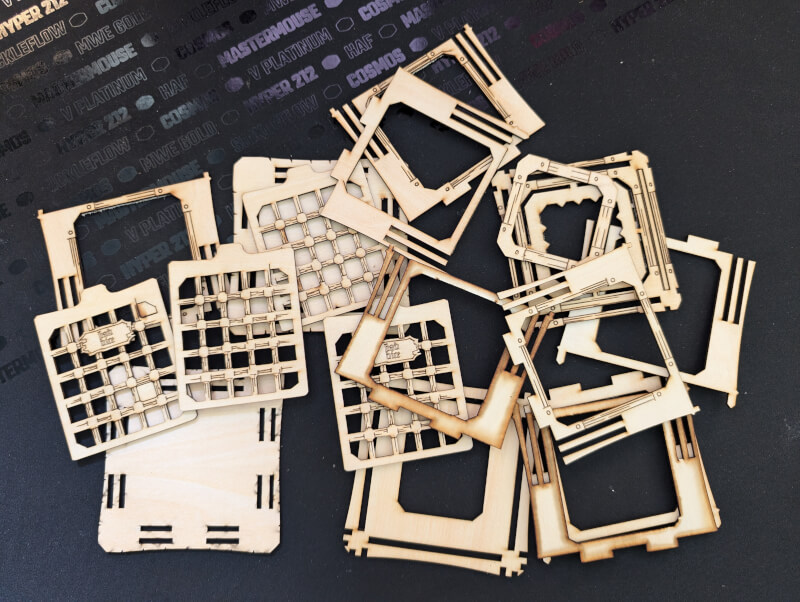
My attempt was a file for a Dicejail assembly kit. After a few attempts to find the right settings for the selected material, I got the Elegoo Phecda up and running. After a few hours and changing materials a few times, I was left with the finished parts.
Elegoo Phecda works relatively quickly and in my test gave reasonable results, but left me smelling a bit of a fire.
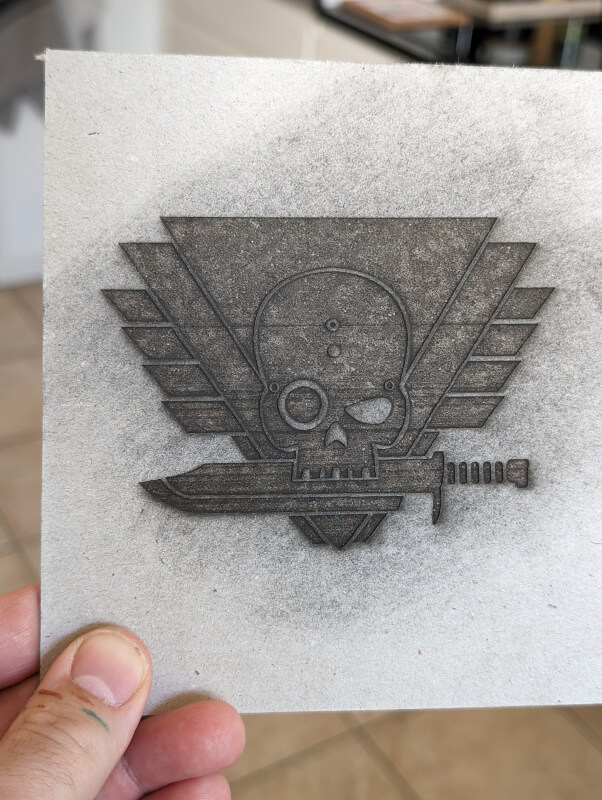
After my tests, however, I was left with the feeling that I needed more accessories to get the best experience out of the machine.
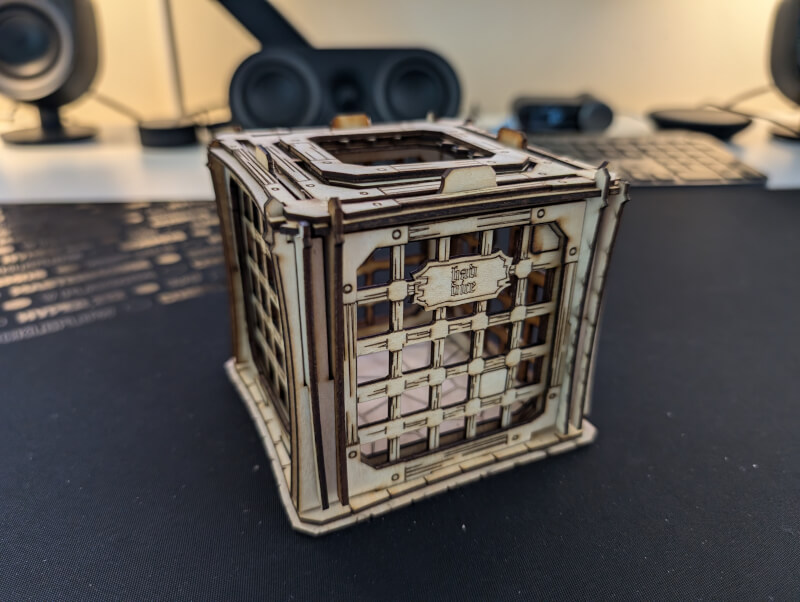
For example, it is not optimal to cut on a flat solid surface, such as a table. On the one hand, it creates quite a few marks on the substrate, but the machine also does not cut completely cleanly when there is no air under the item you want to cut.
The solution to that problem is a Honeycomb mesh underlay. It is not included as standard, but can be obtained in the larger bundles or purchased separately from Elegoo.
It's probably to keep the price down that Elegoo has refrained from making it standard, but it should be a must have in my book.
Price
Elegoo Phecda is currently soldout directly from Elegoo's website but listed with a price of 235$.
It clearly lands on the cheap end if you compare it to the market for laser cutters in general, which can easily reach prices well over 1000$.
The a pretty comparable product I could find was a Creality 3D - Falcon 2 Laser Engraver - 22W, which was listed with a price of of just under 530$. So it certainly looks like Elegoo is aiming to compete on price.
Conclusion
Phecda is Elegoo's first offer for a Laser cutter and was originally launched as a Kickstarter. However, it is out in normal trade now and is a reasonable offer for an Entry Level laser cutter.
It is a solution that provides a good level of options and functionality. However, it is also a product that bears the stamp of being Elegoo's first attempt with this product category.
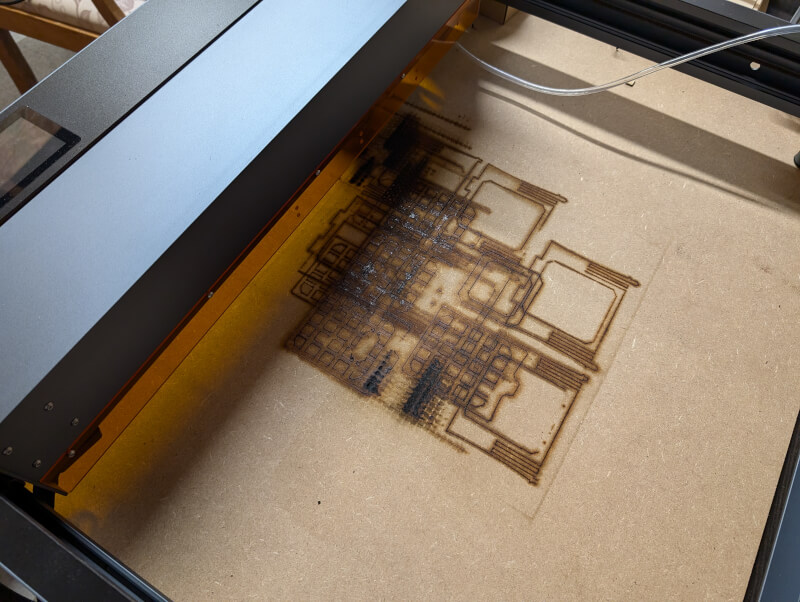
So it is nowhere near as trimmed and well-executed a package as their various series of 3D Printers, with which they have a lot of experience by now.
However, they manage to deliver a product that beats most others on the market at the price for comparable features.
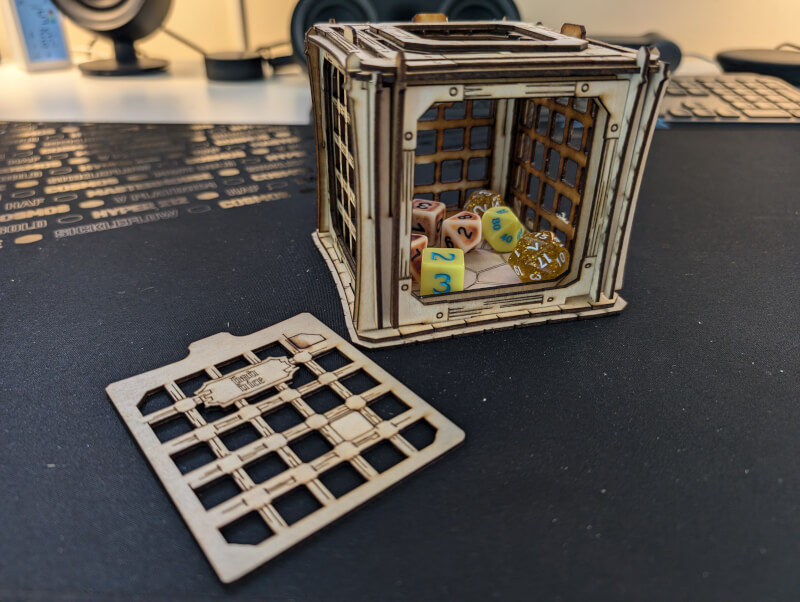
If you would like to get acquainted with laser cutting, but are not ready to allocate 5,000-10,000 kroner to it, then Elegoo Phecda can be a place to start and work on from.
However, you must be aware that it is not a completely polished product, and that laser cutting is generally a hobby with a significant learning curve.
The network functionality and Elegoo's app were unusable during my test. However, it was not something that ultimately had a practical meaning for the way I chose to use the machine. When it is so poorly implemented, Elegoo should probably have just left it alone.
We end up with a final score of 8 for a reasonable product at a fairly low price point, which does, however, need a bit of polish.
Advantage
- Cheaper than most comparisons. products
- Cuts and engraves a wide range of materials
Disadvantages
- Missing a bit of the "quality of life" features that more expensive alternatives have
- Network functionality and app was pretty much unusable

Latest gadgets
-
19 Sepgadgets
-
23 Maygadgets
LaserPecker LP5 Laser Engraver
-
01 Maygadgets
Swytch launches Swytch Max+ Kit
-
10 Margadgets
DJI AIR 3S
-
03 Margadgets
Razer Wolverine V3 Pro
-
21 Febgadgets
OBSBOT Tiny 2 SE
-
13 Febgadgets
Corsair launches Platform:4
-
17 Jangadgets
Nerdytek Cycon3
Most read gadgets
Latest gadgets
-
19 Sepgadgets
DJI launches Mini 5 Pro
-
23 Maygadgets
LaserPecker LP5 Laser Engraver
-
01 Maygadgets
Swytch launches Swytch Max+ Kit
-
10 Margadgets
DJI AIR 3S
-
03 Margadgets
Razer Wolverine V3 Pro
-
21 Febgadgets
OBSBOT Tiny 2 SE
-
13 Febgadgets
Corsair launches Platform:4
-
17 Jangadgets
Nerdytek Cycon3






